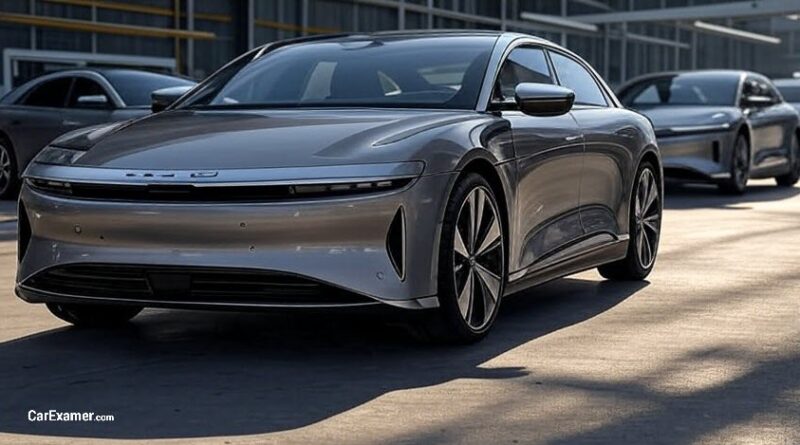Lucid Cuts Annual Production Forecast as Global Trade Struggles
Lucid Motors, the California-based electric vehicle manufacturer, has announced a sharp cut to its 2025 production forecast. The revision comes as global trade tensions rise, costs increase, and electric vehicle demand begins to slow in key markets. This development is a major indicator of the growing pressure faced by high-end EV makers in a shifting economic and political landscape. Let’s have a look why Lucid Cuts Annual Production and impacts of the decision.
What Lucid Confirmed
In its recent Q2 earnings report, Lucid revealed it now expects to produce between 60,000 and 70,000 vehicles for the year. That’s a significant drop from its original estimate of 90,000 to 100,000 units.
This is the second time Lucid has lowered its production forecast in the last year, underlining the real-world challenges facing even the most innovative EV brands.
Why Lucid Is Cutting Back
1. Global Trade Conflicts and Rising Tariffs
Ongoing tensions between the United States and China have led to steep tariffs on imported EVs, batteries, and critical raw materials. In response, China is weighing its own restrictions, which could directly impact American carmakers with global supply chains.
For Lucid, this means:
- Higher costs for essential parts and materials
- Delays in shipping and customs clearance
- Limited access to Chinese-sourced battery components
These issues have made it harder for Lucid to scale production efficiently.
2. Slower EV Demand in North America and Europe
Consumer demand for electric vehicles is no longer growing at the pace seen in recent years. With interest rates rising and household budgets under pressure, more buyers are delaying or cancelling EV purchases. Subsidy cuts in Europe and the US have also made new EVs less financially attractive.
Luxury EVs, like those offered by Lucid, are especially vulnerable, as they compete at the top end of the market where buyers are more price-sensitive during economic uncertainty.
3. Ongoing Supply Chain Disruptions
Although Lucid has invested heavily in its Arizona factory, many key components still come from overseas. Persistent issues with suppliers, especially in Asia, have caused delays in drivetrain and battery production.
Parts shortages have led to slower delivery times and forced Lucid to prioritise high-margin trims of the Lucid Air over broader volume.
4. Higher Operating Costs
Like most manufacturers, Lucid has been hit by rising costs. This includes raw materials, transport, energy, and labour. These pressures have made it harder to maintain aggressive production targets without sacrificing quality or margin.
By reducing its output forecast, Lucid hopes to focus on efficiency and profitability in the short term.
How the Market Responded
Lucid’s stock fell by more than 8 percent in after-hours trading following the announcement. Investors are re-evaluating short-term growth potential, although many still believe Lucid has a strong long-term position thanks to its in-house EV technology and battery systems.
What This Means for EV Shoppers and Investors
For EV Buyers:
- Expect longer waiting times for new Lucid models
- Discounts may be unlikely in the short term
- Limited availability of lower-spec variants
For Investors:
- Continued volatility in the EV sector
- Lucid may shift more focus toward international expansion
- Strategic partnerships and cost-saving measures will be key to survival
Lucid’s Response and Long-Term Plan
Despite cutting its forecast, Lucid remains confident in its strategy. The company is moving forward with the launch of the Lucid Gravity SUV, a key product aimed at the premium crossover market.
Lucid is also expanding internationally, with support from the Saudi Public Investment Fund. Plans are underway to begin assembly operations in Saudi Arabia, which would reduce dependency on North American and Asian supply chains.
Final Thoughts
Lucid’s production cut is not just a one-off decision. It reflects a broader trend in the global electric vehicle industry. Rising geopolitical risks, softening demand, and supply chain instability are now key challenges even for top-tier EV manufacturers.
Lucid has the technology, vision, and backing to survive the turbulence. But success will depend on its ability to adapt quickly, streamline operations, and build stronger regional supply networks.
Buying a used VW. Buying used vauxhall, BMW, Jaguar, Ford, Volvo, Range rover, Bentley, Aston Martin, Porsche, Ferrari, Lamborghini, Maserati, Hyundai, Tesla, Honda, Pagani

